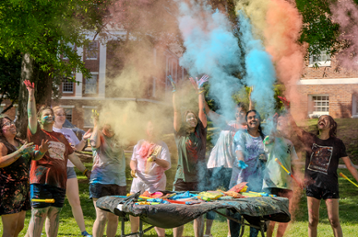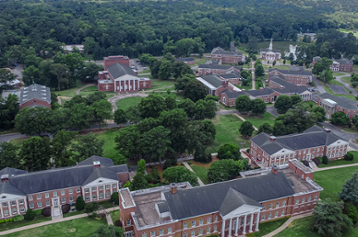Student Counseling Services (SCS) provides short-term individual counseling to currently enrolled, full-time Wesleyan College students. Individual counseling provides an opportunity to explore your concerns on a one-to-one basis within the context of a confidential relationship. The counseling model attempts to empower you with the resources needed to make positive changes in your life. The counselor and student work together to define and discuss personal issues and reach mutually agreed upon goals.
Counseling is not a mysterious process. It is a process in which you and I work together to overcome obstacles which may be preventing you from reaching your fullest potential. Student Counseling Services (SCS) provides assistance designed to promote the academic, personal, and social growth. The college years are filled with exciting and challenging times for you. It is normal, even expected, that you will encounter difficult or stressful events. However, when you use the resources available to you, there is a much greater chance of success and overall sense of well-being.
Uwill provides students access to physicians and therapists. Doctors are board certified and therapists are licensed. Book an appointment with Uwill. On-demand crisis counseling is available 24/7. If you have an urgent need to speak with a counselor, call 833-646-1526.
Jill Amos, Assistant Dean of Student Support, Health, and Wellness, promotes and advocates for a welcoming environment while encouraging access and appropriate accommodations for students. She serves as the ADA compliance coordinator and oversees special funding sources for students with extenuating circumstances. She assists students with problem solving, helping to identify appropriate resources on and off campus as students learn to advocate for themselves. Jill assists community members with reports of Title IX and Title VI violations, including harassment, sexual misconduct, and discrimination, and works with the Human Resources Director for Title VII investigations. Jill handles these sensitive matters with empathy and attention to detail. She works with a team of trained investigators and deputies to investigate Title IX violation reports while providing resources and support for all involved in the process.You can book Jill Amos at disabilityadvocacyservices.youcanbook.me/.
Myrana Craig, LPC, is a licensed counselor who uses Dialectical Behavioral Therapy, Solution-Focused Therapy, and various research based therapeutic approaches to empower students with the resources to make positive changes in their lives. The counselor and student work together to discuss personal issues and aid the student in defining their personal goals. Through counseling a student will be able to overcome obstacles which may be preventing them from reaching their full potential. Should the student miss more than three counseling appointments, their account will be charged a $20 late fee for each subsequent session. For more information see the Student Counseling Services website or other website resources listed below. You can book Myrana Craig at myrana-craig-counseling.youcanbook.me/.
Chief Diversity Officer, Katina Cabiness, is our campus equity and inclusion leader. Her office provides support, advocacy, trainings, and other learning opportunities for campus members to be informed, engaged, and intentional about inclusive behaviors and practices. Contact Katina at kcabiness@wesleyancollege.edu.
Rev. Rachel Paul Hartman is our campus Chaplain who supports students with pastoral and spiritual needs, facilitates faith development and coordinates community engagement through service. Supported by the Office for Equity and Inclusion, Faith and Service programming from the Chaplain provides a space for friendships, genuine conversations, personal reflection, and support for one's faith and values. The College Chaplain is available to help students process life’s big questions, whether a student is trying to make sense of self-identity and belonging, wrestling with questions of faith or doubt, or just needing someone to listen. Chaplain Rachel can connect students, faculty, and staff to local religious organizations and nonprofit organization volunteer opportunities by request. The Chaplain's office provides a non-judgmental space for reflection, emotional and spiritual support, and affirmation. Contact Rev. Rachel Paul Hartmann at rpaulhartman@wesleyancollege.edu.
Nurse Practitioner, Kristen Hallett, is the student resource for health-related information. She can assist with the medical management of some mental health conditions, nutrition counseling, weight management, sleep hygiene, women's health, minor illnesses, and injuries. She also handles referrals to both our on-campus physician and off-campus for mental health care and treatment as appropriate. You can book Kristen at Hallett at wesleyancollegehealthservices.youcanbook.me.
Hannah Matthews, Office of Violence Against Women (OVW) Program Coordinator, through a grant made possible by OVW, is responsible for developing services and programs designed to address and prevent domestic violence, dating violence, sexual assault and stalking. Hannah heads up the community response team of on-campus and off-campus partners to look at ways to better serve students. Please reach out to Hannah with any DV, DV, SA, S needs for additional resource linkage. Hannah’s office is located in Student Affairs and can be reached at lmatthews@wesleyancollege.edu.
Lactation Room: You will find the lactation room for students, faculty and staff in OSP's Belk Leadership Suites, Room G30. The room is equipped with a refrigerator for storage, chairs, table and paper towel dispenser. There is a lock feature on the door to ensure privacy. It is conveniently located right beside a gender neutral bathroom. For information or questions, please contact Jill Amos at jamos@wesleyancollege.edu.
Mathews Athletic Center: Mathews Athletic Center serves you by providing fun, active programs to enhance your health and quality of life on campus. Students can access a large variety of group fitness classes taught by certified instructors. For a full class schedule, MAC hours, and more, visit the Mathews Athletic Center website.
Multifaith Prayer Room: Wesleyan’s Multifaith Prayer Room is located on the third floor of OSP, Room 306. Students, faculty, and staff are welcome to use the space for personal prayer, meditation, and reflection. Various religious prayer supplies are provided however we ask that you leave them in the space for the next person to use. If requesting to use the space for designated group prayer, please email Chaplain Rachel: rpaulhartman@wesleyancollege.edu.
Self-Help:
counsellingresource.com
www.dr-bob.org/vpc/virtulets.html
goaskalice.columbia.edu
General Information:
Crisis Text Line
www.helpguide.org
www.mentalhealth.gov
www.nimh.nih.gov/index.shtml
teenmentalhealth.org
psychcentral.com
www.nami.org
https://addiction-counselor.org/resources/mental-health/
https://www.helpadvisor.com/
College Students and Mental Health:
www.activeminds.org/index.php
www.ulifeline.org
www.jedfoundation.org
www.halfofus.com
www.loveislouder.com
Transition to College:
www.transitionyear.org/
www.psychologytoday.com
Alcohol and Other Drugs Resource List
Georgia Free Rehab Centers
https://www.freerehabcenters.
River Edge Recovery Center
3575 Fulton Mill Road
Macon, Georgia 31206
478-803-7600
www.river-edge.org/addiction-recovery
Twin Lakes Recovery Center, Monroe, GA
twinlakesrecoverycenter.com
Bluff Plantation, Augusta, GA
www.bluffplantation.com
Blue Ridge Mountain Recovery, Ball Ground, GA
www.blueridgemountainrecovery.com
Georgia Pines, Thomasville, GA
georgiapines.net
Willingway, Statesboro, GA
https://willingway.com
Ridgeway Institute, Smyrna, GA
ridgeviewinstitute.com
Drug & Alcohol Addiction:
www.drugabuse.gov
www.addictioneducationsociety.org
www.addictioncenter.com/addiction
www.addiction-treatment-services.com
www.alcoholrhabhelp.org
ADHD:
www.additudemag.com
www.help4adhd.org
www.totallyadd.com
Anxiety:
www.anxietynetwork.com
www.adaa.org
www.nimh.nih.gov/health/topics/anxiety-disorders
Bipolar Disorder:
www.bphope.com
www.dbsalliance.org/site/PageServer?pagename=home
Depression:
www.helpguide.org/articles/depression/dealing-with-depression.htm
studentsagainstdepression.org
Eating Disorders:
www.anad.org
www.nationaleatingdisorders.org
www.eatingdisorderhope.com/programs
www.something-fishy.org
LBGTQ:
www.campuspride.org
www.thetrevorproject.org
www.glaad.org
www.glbthotline.org/hotline.html
Mental Health Trends in Software Engineering:
https://www.softwaredegrees.
Psychosis:
www.nami.org/psychosis
www.psychguides.com/guides/psychosis-symptoms-causes-and-effects/
www.mentalhealthamerica.net/conditions/psychosis
Self-Injury:
www.sioutreach.org
www.twloha.com
www.selfinjury.com
Sexual Assault:
National Sexual Assault Support Hotline - 800-655-HOPE
www.metoomvmt.org
www.rainn.org
Suicide:
National Suicide Prevention Lifeline 1-800-273-8255(TALK)
www.thetrevorproject.org
www.sprc.org
www.afsp.org
www.suicidepreventionlifeline.org
www.suicide.org/college-student-suicide.html
Self-Help Booklists from Goodreads.com
www.goodreads.com/list/tag/self-help
Online Mental Health Screenings:
screening.mentalhealthscreening.org
dbsalliance.org
24/7 Crisis Resources:
www.crisistextline.org/get-help-now/
www.suicidepreventionlifeline.org/
Life-Line: (478) 741-1355 or (800) 548-4221
Piedmont Healthcare (Coliseum Center for Behavioral Health)
LifeLine 24-Hour Crisis Help Line
(478) 741-1355 or (800) 548-4221
340 Hospital Drive, Bldg E
Macon, GA 31217
coliseumhealthsystem.com/our-services/behavioral-health/
River Edge Behavioral Health Center
175 Emery Highway
Macon, Georgia 31217
478-803-7600
www.river-edge.org/
Crisis Line & Safe House of Central Georgia
(Sexual Assault and Domestic Violence)
24-Hour Crisis Hotline
478-745-9292
cl-sh.org/
Navicent Health
777 Hemlock Street
Macon, GA 31201
478-633-1000
www.navicenthealth.org/
River Edge Recovery Center
3575 Fulton Mill Road
Macon, Georgia 31206
(478) 803-7600
www.river-edge.org/addiction-recovery
Twin Lakes Recovery Center
Monroe, GA
twinlakesrecoverycenter.com
Bluff Plantation
Augusta, GA
www.bluffplantation.com/
Blue Ridge Mountain Recovery
Ball Ground, GA
www.blueridgemountainrecovery.com
Georgia Pines
Thomasville, GA
georgiapines.net
Willingway
Statesboro, GA
willingway.com
Ridgeway Institute
Smyrna, GA
ridgeviewinstitute.com
The Recovery Village Atlanta Alcohol and Drug Rehab
https://startyourrecovery.org/treatment/rehab-centers/georgia
11725 Pointe Place
Roswell, GA. 30076
470-990-9483
Peachtree Detox
1008 GA-54
Fayetteville, GA 30214
470-333-6898
Buckhead Behavioral Health
2285 Peachtree Road, Suite 210
Atlanta, GA 30309
470-460-6789
Hosted by Dr. Ali Ahmadi and Coliseum Psychiatric Center
For patients, family and friends who want to better understand how to live more productively with bipolar disorder;
Hosted by the Coliseum Center for Behavioral Health
Our bipolar support group meets weekly to give patients, family and friends more information about this behavioral disorder. This is the perfect program for people who want to better understand how to live more productively with bipolar disorder or how to give support to a loved one who is suffering from bipolar disorder.
Helping Hands Grief Support
This group offers emotional support for those who have experienced the loss of a loved one.
For more information, call (478) 464-1401.
Survivors of Suicide
This group provides support for family and friends of persons whose deaths were intentional.
For more information, call (478) 741-1355.
Tamy J. Blanding
Phone: (478) 714-9803
Email: anadmiddlega@aol.com
Eating Disorders Anonymous
Eating Disorders Anonymous meets in the St. Gregory room (look for a building named "Parish Hall") Contact 912-541-1679 (Kristi Baston) for more information.
Counseling is a psychotherapeutic service whereby “normal” everyday people receive help with “normal” everyday problems. The basic premise of counseling is that the person seeking help possesses within himself or herself the resources to solve the problem. By utilizing their skills and creating a special nonjudgmental atmosphere, the counselor is able to facilitate this process. Counseling is:
All people face difficulties during their lives, you as a college student are no different. There’s nothing wrong with asking for help. So, what are you waiting for?
College is a very unique time in a person’s life. Some students are very young and away from home for the first time. Other students may be going back to school with the responsibility of a family to start a new career. No matter their reason for being in college, the lessons learned and obstacles overcome during their college years can provide a wonderful opportunity for emotional growth and maturity. However, these lessons and obstacles can also result in negative consequences such as overwhelming stress, psychological problems, and academic difficulties that affect the performance of the student. Counseling services are designed to assist students with addressing the difficulties that they encounter during these years and to promote greater overall wellness within the student population.
Students come to counseling with many concerns. Here are a few examples:
Health and Wellness: binge drinking, body image, unhealthy eating patterns, STDs, sexual assault
FACT: Important changes often take time and energy in order to occur. Although many people feel some relief and improved mood after only a couple of sessions, counseling will not provide a quick fix to your problems. Counseling can help you work toward meaningful life change over the long term, in addition to helping you manage current difficulties more effectively.
FACT: Seeing a counselor does not mean that you are mentally ill or "crazy." In addition to addressing more serious emotional problems, counseling can help with: life transitions adjusting to new surroundings difficulty juggling school, work, family, and other responsibilities academic problems, difficulty in test-taking and/or test anxiety struggles with self-esteem, communication, or assertiveness relationship problems
FACT: While each person presents to counseling with their own unique concerns, many of those concerns are similar to their peers.
FACT: Mental health affects all aspects of our lives and daily functioning.
FACT: Counseling is not a quick cure for your problems. The counselor is there to help you explore your feelings, thoughts, and concerns; to examine your options; and to assist you in achieving the goals you have set.
Services include individual therapy, consultant and referral services, and outreach programming.
Appointments may be made with our counselor, Myrana Craig, online.
Appointments last approximately 45 minutes. Sessions are limited to a maximum of 4-6 sessions this semester. If a longer-term therapy experience or more intensive treatment is desired or clinically-indicated, then a referral to a private therapist or community service will be made as early as possible.
In order to be fair to all students and ensure access and availability to the counselor, there will be a no show fee of $20. Students who make an appointment and do not show and do not cancel 24 hours in advance will be charged a $20 no show fee.
All information within the counseling treatment is confidential. Information may only be disclosed with the student’s written permission. A student under the age of 18 must have parental consent to seek counseling services.
Confidentiality does not apply to the following situations:
Reported or suspected physical or sexual abuse of a child (under age 18), disabled adult, or the elderly
No. Counseling records are separate from a student’s academic record. Counseling records are kept by the Counseling Office for a minimum of 7 years and are then destroyed.
In a life threatening emergency call 911 immediately. Then call Campus Police at (478) 960-7969 or (478) 757-5145.
For non-life threatening urgent matters during normal business hours (Monday—Friday, 8:30am—5:00pm), students may walk-in or call Student Affairs main office at (478) 757-5214. After hours and on holidays and weekends, students should call Wesleyan College Campus Police at (478) 960-7969 or (478) 757-5145.
There are some mental health-related services that student counseling services is unable to provide (e.g., learning disability assessment, long-term psychotherapy). If one of these services is required, students will be provided assistance with the referral process. Please be aware that these services generally involve a fee. In some cases, health insurance may cover some of the costs. Referrals will be made as necessary.
Questions? Contact Myrana Craig at mcraig@wesleyancollege.edu
Student Counseling Services
9am-3pm / Monday - Friday
Olive Swann Porter Building
Student Affairs:
(478) 757-4024
or (478) 757-5214
Fax: (478) 757-4027

Wesleyan College is privileged to steward many arts and cultural events and share them with the community. Most are free and open to the public. Wesleyan art galleries are open M-F 1-5PM and on Wesleyan Market Saturdays from 10AM-2PM.
Event listing
Wesleyan College is home to five NCAA Division III sports: soccer, basketball, volleyball, tennis, and softball. In addition, we offer an award-winning Intercollegiate Horse Show Association (IHSA) Equestrian program.
View More
Tour our beautiful 200-acre campus featuring Georgian architecture, lush green spaces, recreational facilities, residence halls, and worship center.
Vist Wesleyan Virtually